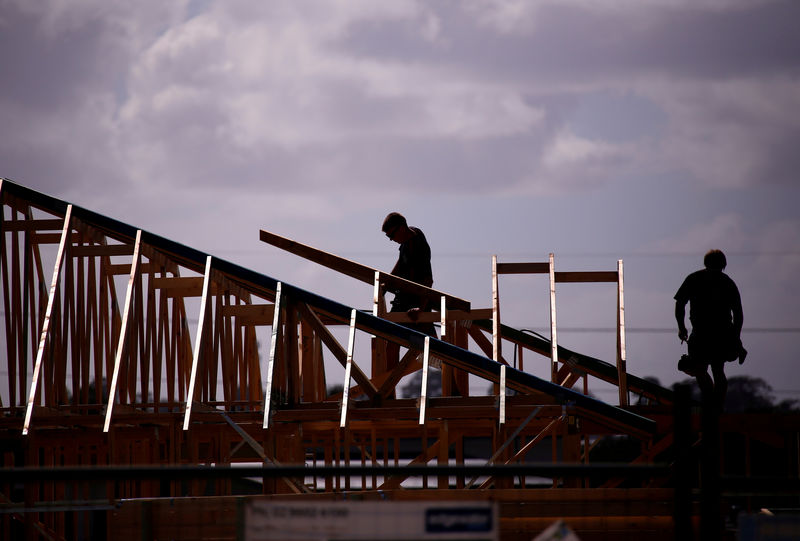By Tom Westbrook
SYDNEY (Reuters) - At the height of Australia's residential property boom two years ago, Sydney builder Toby Searle couldn't get carpenters and bricklayers to return his phone calls, such was the demand for workers.
Now he can't stop them ringing. "All of a sudden we were getting emails, phone calls, people coming to site and dropping business cards off just looking to get a foot in the door," he said. "Some guys would be struggling out there."
Demand for new building work has slowed to a crawl, with home building approvals in May plunging to six-year lows, in concert with tighter lending and a sharp slide in home values.
The pullback, in a construction sector that employs nearly a tenth of the national workforce, is weighing on the faltering economy just as the central bank puts unemployment and underemployment at the top of its list of hard-to-fix problems.
Then there is the knock-on effect, as the dwindling appetite for building ricochets through the supply chain, slowing land releases, crimping sales in timberyards, and driving layoffs from labor hire firms to engineers and architects.
"We've clear evidence of projects put on ice," architect Greg Barnett told Reuters in the offices of his Sydney firm, where the slowdown has meant laying off about 10% of his 100-strong workforce of designers.
"We knew it was coming, but not as severe as it has. It's been a very quick stop."
'JOBS ARE AT THEIR ZENITH'
As home prices in Sydney and Melbourne have posted their sharpest drops in a generation, falling by 11% and 15% respectively from peaks in 2017, plans for property development and house construction have dried up.
A fall in home building approvals, which hit their lowest since 2013, is now flowing through to work underway.
Trade hours worked posted their sharpest fall in more than three years, dropping 2.5% in May, according to Australian Bureau of Statistics data, and the industry expects more to come.
"Our jobs under construction are at their zenith," said Peter Levinge, chief executive of family-owned Melbourne home-building company, Dennis Family Corporation, which has some 670 jobs in progress.
"Over the next 12 months or so, that will start to fall away as the pipeline decreases," he told Reuters in a telephone interview.
"If you're not filling your pipeline at the same rate as you're taking jobs to site, obviously that forces your workforce, or your use of subcontracted labor, to diminish."
To be sure, other construction sectors are picking up some slack, with office and infrastructure building still strong, keeping overall construction levels not far below their 2018 peak.
And recent signs the property market has stabilized have driven a lift in inquiries at Levigne's Melbourne sales offices that has him optimistic.
But few in the industry expect a meaningful improvement within a year, which will leave tradesmen from carpenters to bricklayers scrambling for work in the meantime.
"Land sales have been pretty slow for the last 12 months," said Jack Hoffman, general manager for Australia's largest privately owned land developer, Satterley Property Group, which had people queuing for land sales in Victoria state a year ago.
"If sales of land slow down, then home building will slow down as well," he said, while hoping for a pickup "perhaps some time next year".
QUIETENED UP
It may not be soon enough. Australia's central bank is counting on labor market strength to lift wages and inflation while it cuts interest rates to record lows to try and stimulate growth.
Australia's economy is growing at its slowest in a decade, and weakness across the construction supply chain will only weigh further.
It has already prompted building supplier Boral Ltd (AX:BLD) to cut its domestic outlook and New Zealand-headquartered Fletcher Building Ltd (NZ:FBU) to warn last month of a deeper-than-expected hit to its Australian building supplies outlets.
Timberyards which struggled to fill orders two years ago have turned quiet and so have the phones at labor hire firms.
"A lot of our clients are telling us that they're a bit quieter," said Sorcha Hunter, director of Hunter Labour Hire, a Sydney-based firm that provides workers for residential and commercial building projects across the city.
The sentiment has investors at once gloomy and on the lookout for bargains.
"I wouldn't say I'm particularly confident about the building cycle in Australia," said Simon Mawhinney, chief investment officer at fund manager Allan Gray, who expects a further downturn in the sector.
"But it's also important to look at these things from the perspective of how much you pay," he added, noting a recent investment in supplier CSR Ltd (AX:CSR) had performed well, with the stock lifting from multi-year lows after asset sales.
Nevertheless, those on the coalface are steeling themselves for tough times ahead. "It's definitely quietened up," Sydney builder Charlie Kobayati said.

"We're being undercut. People are getting desperate."